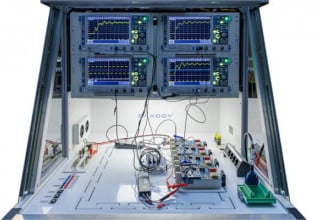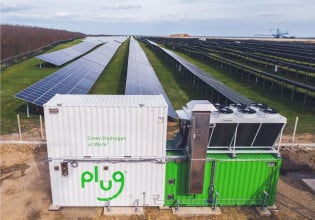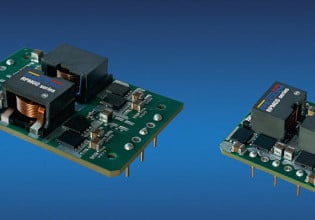Measurement Accuracy ensures Reliable Returns for Solar Power Plants
Reliable returns for solar power plants can only be determined by high-precision performance measurements on photovoltaic (PV) modules. A low measurement inaccuracy is a prerequisite for this.
"TÜV Rheinland's accredited laboratories achieve a measurement uncertainty of less than +/-1.5 percent in relation to the measured performance of PV modules," explains Dr. Werner Herrmann, Senior Expert at TÜV Rheinland.
The performance characteristics of PV modules are tested in accredited laboratories, for example on the basis of a statistically relevant sample. The test result decides whether the contract is fulfilled or the delivery prices to be negotiated. The lower the uncertainty of measurement in the laboratory, the more accurately the yield can be calculated and the lower the risk of lower yields.
In the case of a large solar system, one percent miscalculation due to inaccurate measured values in determining the yield over the 20-year term can amount to millions. Example: a 50MW solar plant in Southern Europe. A measurement inaccuracy of only one percent can lead to a monetary yield difference of more than 300,000 euros per year (based on a feed-in tariff of 0.05€ / kWh), which corresponds to approximately one percent.
"Measurement uncertainties can never be stated across the board. They depend on the technology of the PV module," emphasizes Herrmann.
For high-precision measurements, not only the exact determination of temperature coefficients but also a measurement of spectral sensitivity is necessary. Such a PV module calibration involves a great deal of effort and is therefore not feasible for every individual measurement of PV modules.
When large samples are measured, experts usually calibrate a reference module and other PV modules relative to it. Important: a reliable reproducibility of the measurement.
More security for manufacturers and investors
If TÜV Rheinland measures reference modules with which the manufacturer adjusts its sun simulators in production, the nominal output of the PV modules from production can be shown more precisely. More precise performance values and possibly even lower risk surcharges to meet performance commitments increase the price of PV modules.
Tolerances are also a necessary component of performance specifications in international tenders. The reduction of the measurement uncertainty for the power rating of solar modules requires in-depth technical know-how, high-quality and regularly calibrated equipment as well as an adjustment of many individual adjusting screws.
For example, regular testing of the lighting properties of the sun simulators used in the laboratory is an important quality assurance measure.
More than 90 different contributions to measurement uncertainty must be combined in the concatenation of influencing variables on a measurement result. Temperature sensors, irradiation sensors, current and voltage measurement input, light quality and ambient conditions as well as the technology-dependent influences of the PV modules are considered and provided with measurement uncertainty contributions.
Further influencing variables include the temporal dynamics of the current-voltage measurement, the temperature and irradiation correction of the measurement curve to the nominal values under standard test conditions (STC), repeatabilities or the spectral sensitivity of the PV modules.
"In our view, equipment and process engineering factors are assessed extremely sharply but also very conservatively. An external uncertainty contribution for the primary calibration of the reference cells used at the Physikalisch Technische Bundesanstalt is added," confirms Dr. Werner Herrmann, expert in the field of solar simulator measurement technology.
A precise measurement uncertainty analysis is a complex task in which TÜV Rheinland supports the PV module manufacturers and promotes confidence in the data sheet information - to the benefit of the investors.






